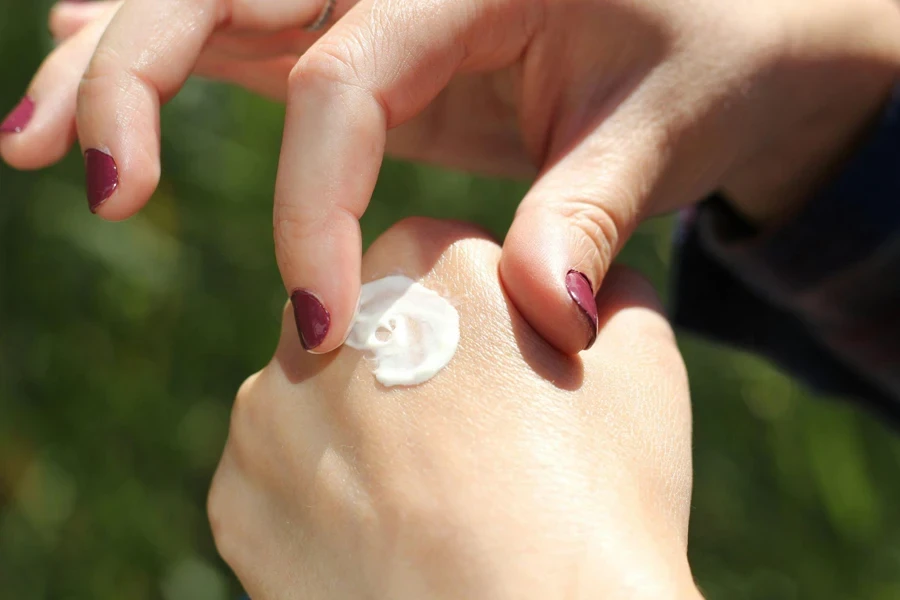The latest trends in skincare routines highlight that consumers are looking for effective solutions for their dry skin. However, despite the popularity of moisturizers, choosing a moisturizer that suits one’s skin, especially when it comes to tackling dryness-related issues, can make this process daunting for consumers.
This presents an opportunity for sellers to offer various moisturizers for dry skin, catering to the needs, specialized formulations, and budgets of their end customers.
To ensure you are able to successfully tap into this market, read on to discover how to source and recommend a range of moisturizers catered to all skin care needs in 2025.
Table of Contents
1. The business potential of moisturizers for dry skin
2. What to look for when selecting moisturizers for dry skin?
3. How to choose the best moisturizers for your customers?
4. Conclusion
The business potential of moisturizers for dry skin
The global moisturizer market was valued at USD 10.60 million in 2023, and in 2024, it’s projected to reach USD 11.02 billion. As per the report, the compound annual growth rate (CAGR) is estimated to be 5.34%.
Besides this growth, the market has a lot of potential for sellers due to high demand and other major factors. Specifically, more and more people with dry skin are looking for effective moisturizers that can handle the lifestyle, climate, and other aging-related challenges.
The market for dry skin moisturizers caters to different skin conditions, preferences, and requirements, allowing sellers to pick specialized products, whether they are for anti-aging or sensitive skin.
It’s also worth noting that this product comes with recurring revenue as most people use their moisturizer on a daily basis, causing repeat purchases and providing steady income for sellers.
What to look for when selecting moisturizers for dry skin?
Before selecting moisturizers for dry skin, sellers are required to understand basic pointers to ensure more sales. These include:
Ingredients suitable for dry skin
Start with understanding the ingredients and their types. Some of the major active ingredients that sellers should look for include:
Emollients
These are the chemicals that work as lubricants for dry skin. The key role of such ingredients is to help maintain the skin’s elasticity, smoothness, and softness.
Consumers who have dry skin look for moisturizers with emollients to reduce their wrinkles and fine lines, reverse dryness, and more.
This is also an important ingredient for reducing the reaction to irritants like shea butter, coconut oil, and ceramides.
Humectants

Moisturizers containing humectants help in hydrating the dry skin as these act as magnets for attracting water molecules. It can be available as a synthetic and natural humectant.
The synthetic humectants in moisturizers include tremella extract, glycerin, butylene glycol, and more. Whereas natural humectants include aloe vera, hyaluronic acid, and alpha hydroxy acid among others.
Occlusives
Occlusives help dry skin by creating a protective layer that works as a barrier and keeps moisture locked. These ingredients include shea butter, beeswax, and squalene.
These moisturizers help one attain moisture-rich skin while protecting the natural oils. Sellers can also consider dimethicone, petrolatum, and lanolin as ingredients for an occlusive moisturizer.
Ceramides
Half of the epidermis is made using natural ceramides. These are lipids that help to lock the moisture in the skin.
Some of the synthetic moisturizers with ceramides are ceramide 1 (ceramide EOS), ceramide 3 (ceramide NP), and ceramide 6-11 (ceramide AP).
Sellers can consider picking moisturizers with synthetic ceramides as they provide a hydrating boost that targets consumers with dry skin.
Thickness & textures

Depending on the type of skin, the choice of thickness and texture can differ. People with dry skin look for cream-based and gel-based formulations.
Those who have severely dry skin prefer cream-based moisturizers. This kind of moisturizer helps provide intensive hydration and adds a protective barrier that lasts much longer.
As for lightweight moisturizer for dry skin, it is suitable for everyday use. It’s also an ideal pick for people who prefer not to have a heavy feel after applying cream.
Gel-based formulations give a perfect layering without making it heavy and also get absorbed easily.
Pricing of the products
Pricing is an integral part, especially when 93% of people use moisturizer as their common skincare product. Consumers look for moisturizers that either are affordable or offer them value for money.
Sellers can consider the price points depending on the targeted customers’s spending capacity. Consumers prefer moisturizers that not only come within their budget but also deliver noticeable results if they are paying more.
Besides this, product reviews and dermatology approvals with clinical backing are crucial aspects for consumers before they make their purchases.
Skin types & their compatibility

When selecting moisturizers, sellers should look for specific skin types and compatibility. Facial skin is much more delicate and sensitive than body skin. Choosing the right option depends on the skin type and a range of different needs.
Moisturizer for dry facial skin requires something lightweight or gel-based, whereas body moisturizers should be richer and contain more occlusive ingredients.
SPF & fragrances
A good SPF moisturizer for the face should have at least 30 SPF or above, with protection from sun damage like UVB and UVA rays.
Also, consumers with dry skin issues consider botanical and fragrance-free moisturizers, especially if they have skin sensitivity and allergies.
Fragrances and botanicals like cinnamal, fragrance mix, lavender, lemon, balsam of Peru, tea tree oil, peppermint, citric or rose oil, and tocopherol are generally avoided in moisturizers for dry skin.
How to choose the best moisturizers for your customers?
Type of age groups
Different age groups use moisturizers for different skin concerns, which should target their age-related issues.
For example, teens or young adults look for lightweight and non-comedogenic moisturizers. These types help in tackling dry skin without clogging pores. This is especially crucial for young skin as it is more prone to acne-like issues.
Adults from their late 30s onwards tend to focus on moisturizers that address their anti-aging issues while keeping their skin hydrated. These consumers look for ingredients like retinoids and peptides in their moisturizers to handle early aging and dryness.
People above 60 years of age choose moisturizers that are emollient-rich to solve issues of thinning and dryness. Also, this age group chooses moisture to keep their skin firm and reduce wrinkles.
Skin conditions
Skin conditions like eczema and psoriasis are major issues caused by dry skin. Consumers who have such conditions are more likely to consider moisturizers that have thicker oils and creams to handle the excessive dryness.
Also, sellers can pick moisturizers with a combination of occlusive emollients, including mineral oils, beeswax, and ceramides, for these types of consumers.
Lifestyle & preferences of customers
Choosing the right moisturizer also includes understanding the customer’s lifestyle and preferences.
People who have busy and active lifestyles prefer to have lightweight and quick-absorbing moisturizers that don’t leave a greasy feel.
Besides this, some consumers would like to choose higher SPFs to reduce the extra skincare step, saving time and money.
Sellers are also required to pick moisturizers based on consumers who are looking for eco-friendly and cruelty-free products.
Conclusion
The moisturizer market for dry skin offers a potential opportunity for sellers. To make the most of this, sellers should offer specific products in the best way possible, and cater effective solutions for their customers with a range of specific needs.
This blog gives sellers an understanding of what they should look out for to ensure they are selecting the best moisturizers on the market for their buyers in 2025!




